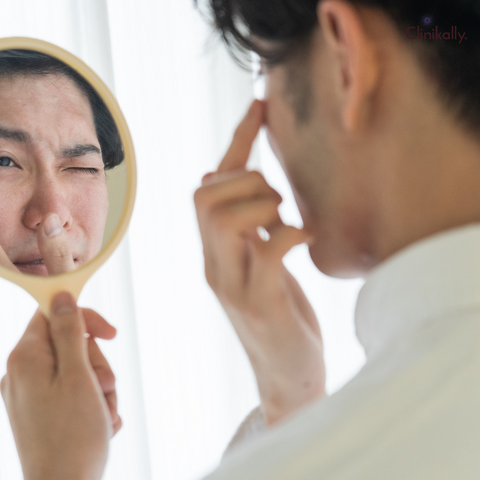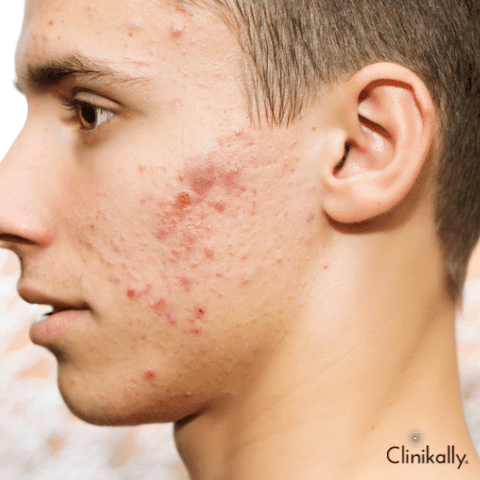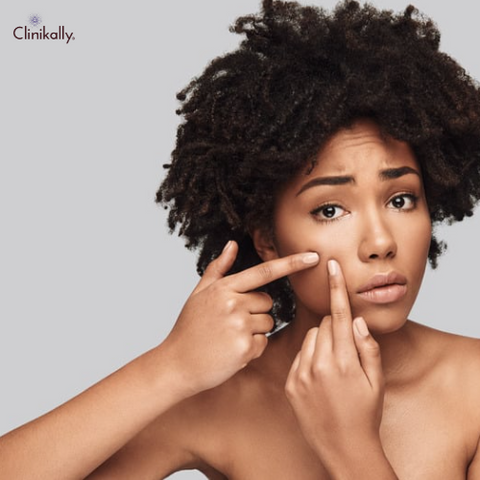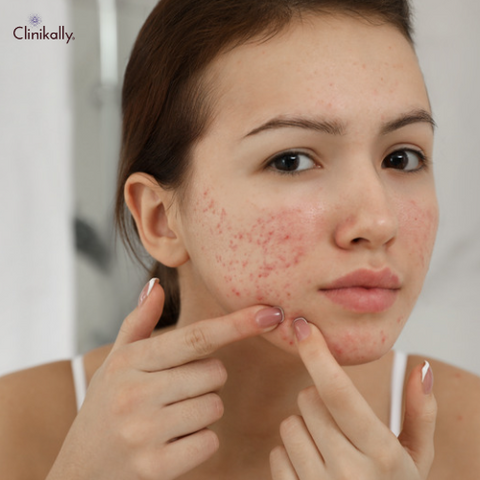Just like the unpredictable weather, acne vulgaris can seemingly appear out of nowhere, causing discomfort, frustration, and an unwelcome change in our appearance. But fear not! You're not alone in this battle against pesky pimples. Acne vulgaris, the most common form of acne, affects millions of people worldwide, and understanding its causes, symptoms, and treatments is the first step toward clearer, healthier skin. In this comprehensive guide, we'll dive into the nitty-gritty of acne vulgaris, exploring its bacterial origins, the various stages and types, and the differences between acne vulgaris and cystic acne. We'll also share some effective at-home remedies and treatments for this all-too-common skin condition. So, roll up your sleeves and get ready to bid farewell to acne vulgaris and embrace the skin you've always wanted!
Types of Acne Vulgaris

When it comes to acne vulgaris, not all blemishes are created equal. Understanding the various types of acne can help you identify the most effective treatment methods and better manage this skin condition. In this section, we'll break down the different types of acne vulgaris, ranging from mild to severe, to help you better comprehend this diverse and complex skin issue.
-
Comedonal acne: This mild form of acne vulgaris is characterized by non-inflammatory lesions called comedones. These are further classified as open comedones (blackheads) and closed comedones (whiteheads). Comedonal acne is usually found on the forehead, nose, and chin and is caused by a build-up of sebum and dead skin cells in hair follicles.
-
Papular acne: Papules are small, raised, red bumps on the skin's surface that result from inflammation. They may be sensitive to touch and are caused by excess oil production and bacteria. Papular acne is considered a moderate form of acne vulgaris.
-
Pustular acne: Pustules are similar to papules in appearance but contain pus. These yellowish, fluid-filled bumps typically form on the face, chest, and back, and are the result of a bacterial infection within the hair follicle. Pustular acne is also considered a moderate form of acne vulgaris.
-
Nodular acne: Nodules are large, solid, and painful lumps that form deep within the skin. This severe form of acne vulgaris is caused by an overgrowth of bacteria, excess oil production, and inflammation. Nodular acne often requires more aggressive treatments, as it can lead to scarring if left untreated.
-
Cystic acne: This is the most severe form of acne vulgaris and is characterized by large, pus-filled cysts that form deep within the skin. Cystic acne can be extremely painful, and if left untreated, it can result in permanent scarring. Due to its severity, cystic acne often requires professional medical intervention.
By understanding the various types of acne vulgaris, you can better identify your specific skin concerns and tailor your treatment plan accordingly. Keep reading to learn more about the causes of acne vulgaris, as well as effective treatment methods and home remedies for clearer, healthier skin.
Causes of Acne Vulgaris

Acne vulgaris is a multifaceted skin condition with various contributing factors. Identifying the root causes of your acne can help you develop a targeted treatment plan and prevent future breakouts. Here are some of the most common factors that contribute to the development of acne vulgaris:
-
Excess oil production: Overactive sebaceous glands produce an excess of sebum (oil), which can mix with dead skin cells and clog hair follicles. This clogging creates an ideal environment for acne-causing bacteria to thrive, leading to the formation of comedones, papules, and pustules.
-
Hormonal fluctuations: Hormonal changes, particularly during puberty, pregnancy, and menstruation, can trigger acne vulgaris. An increase in androgen hormones can lead to the enlargement of sebaceous glands and increased sebum production.
-
Bacteria: Propionibacterium acnes (P. acnes) is the primary acne-causing bacteria. It lives on the skin's surface and thrives in the oily, clogged environment of hair follicles. P. acnes can cause inflammation and infection, leading to the formation of more severe acne lesions like nodules and cysts.
-
Inflammation: Inflammation is a natural response to skin irritation or injury. However, when it comes to acne vulgaris, inflammation can exacerbate the condition, causing redness, swelling, and pain around the affected areas.
-
Genetics: A family history of acne vulgaris may predispose you to develop the condition. If your parents or siblings experienced acne, you are more likely to suffer from it as well.
-
Lifestyle factors: Stress, diet, and certain medications can also contribute to acne vulgaris. High stress levels can increase inflammation and hormone production, leading to breakouts. Similarly, a diet high in refined carbohydrates and sugars may exacerbate acne in some individuals.
Now that you're familiar with the various causes of acne vulgaris, it's time to explore the available treatments and home remedies to effectively manage this skin condition. Stay tuned to discover the most effective ways to combat acne vulgaris and achieve clear, healthy skin.
Treatment of Acne Vulgaris

Finding the right treatment for acne vulgaris can be a daunting task, as there are countless options available. Fortunately, we've compiled a comprehensive list of the most effective treatments for acne vulgaris, ranging from prescription medications to lifestyle changes. Remember, it's essential to consult a dermatologist or healthcare professional before starting any new treatment regimen.
-
Topical treatments: Prescription topical treatments containing benzoyl peroxide, salicylic acid, glycolic acid, or sulphur can be effective in treating mild to moderate acne vulgaris. These active ingredients work by reducing excess oil production, unclogging pores, and killing acne-causing bacteria.
-
Topical retinoids: Topical retinoids like tretinoin, adapalene, and tazarotene help unclog pores and prevent the formation of new acne lesions. They are particularly effective for treating comedonal acne but can also be used in combination with other treatments for more severe cases.
-
Antibiotics: Oral or topical antibiotics, such as clindamycin, erythromycin, or tetracyclines, may be prescribed to treat moderate to severe acne vulgaris. They work by killing P. acnes bacteria and reducing inflammation.
-
Hormonal therapies: For women experiencing hormonally induced acne, oral contraceptives or anti-androgen medications like spironolactone can help regulate hormone levels and reduce sebum production.
-
Isotretinoin: For severe or persistent acne vulgaris that doesn't respond to other treatments, isotretinoin (previously known as Accutane) may be prescribed. This powerful oral medication works by shrinking sebaceous glands, reducing oil production, and preventing new acne lesions from forming. However, isotretinoin has potential side effects and strict monitoring is required during treatment.
-
Chemical peels: Dermatologists may recommend chemical peels containing glycolic or salicylic acid to treat acne vulgaris. These treatments exfoliate the skin, unclog pores, and promote cell turnover, resulting in a clearer complexion.
-
Lifestyle changes: Maintaining a healthy diet, managing stress levels, and practising good skincare habits (like regular cleansing and avoiding pore-clogging cosmetics) can also help improve acne vulgaris.
-
In-office procedures: For more resistant cases, dermatologists may recommend in-office treatments like laser therapy, light therapy, or corticosteroid injections to reduce inflammation and promote healing.
Finding the most effective treatment for your acne vulgaris may require some trial and error, but with patience and guidance from a healthcare professional, you can achieve clearer, healthier skin. In the next section, we'll explore some home remedies that can complement your treatment plan and further improve your complexion.
Home Remedies for Acne Vulgaris
While prescription medications and professional treatments can be highly effective in managing acne vulgaris, incorporating home remedies into your skincare routine can further enhance your results. Here are some natural and easy-to-implement remedies that can help improve your acne vulgaris symptoms:
-
Tea tree oil: With its natural antibacterial and anti-inflammatory properties, tea tree oil can help combat P. acnes bacteria and reduce redness and swelling. Dilute a few drops of tea tree oil with a carrier oil (like jojoba or sweet almond oil) and apply it to affected areas using a cotton swab.
-
Green tea: Rich in antioxidants and anti-inflammatory compounds, green tea can help soothe irritated skin and reduce inflammation. Brew a cup of green tea, let it cool, and then apply it to your face using a cotton ball. Alternatively, you can also look for skincare products containing green tea extract.
-
Honey: Honey is known for its natural antibacterial and wound-healing properties, making it an excellent home remedy for acne vulgaris. Apply raw honey directly to affected areas and leave it on for 10-15 minutes before rinsing with lukewarm water.
-
Apple cider vinegar: Apple cider vinegar contains acetic and lactic acids that can help exfoliate the skin, reduce inflammation, and kill acne-causing bacteria. Dilute one part apple cider vinegar with three parts water and apply the mixture to your skin using a cotton ball. Leave it on for 5-20 minutes and rinse with water. Remember to moisturise afterward, as apple cider vinegar can be drying.
-
Aloe vera: Aloe vera is renowned for its soothing and anti-inflammatory properties, making it an ideal remedy for irritated, acne-prone skin. Apply pure aloe vera gel directly to the affected areas and let it absorb into your skin.
-
Proper skincare routine: Establishing a consistent skincare routine that includes gentle cleansing, exfoliating, and moisturising can help prevent acne vulgaris. Choose non-comedogenic products that won't clog pores and avoid over-cleansing or scrubbing, which can cause irritation.
-
Stress management: Stress can exacerbate acne vulgaris, so finding healthy ways to manage stress, such as meditation, exercise, or hobbies, can improve your skin's overall health.
-
Diet adjustments: While the link between diet and acne is still being researched, some studies suggest that reducing the intake of refined carbohydrates and sugars may help improve acne symptoms. Focus on a balanced diet rich in whole foods, fruits, vegetables, lean protein, and healthy fats.
Remember that home remedies may not work for everyone, and individual results may vary. Always consult with a dermatologist or healthcare professional before trying new remedies, especially if you have sensitive skin or are using prescription medications for acne vulgaris. With a combination of professional treatments, home remedies, and consistent skincare habits, you can effectively manage acne vulgaris and achieve clearer, healthier skin.
Conclusion

Acne vulgaris is a common and complex skin condition that affects millions of people worldwide. Understanding the various types and causes of acne vulgaris is crucial for developing a targeted treatment plan. By exploring different treatment options, such as prescription medications, lifestyle changes, and home remedies, you can find the most effective solutions for your unique skin concerns.
Remember to consult with a dermatologist or healthcare professional before starting any new treatment regimen, as they can provide personalised advice and ensure you're on the right track to healthier, clearer skin. With patience, consistency, and the right combination of treatments, you can effectively manage acne vulgaris and enjoy a more confident, radiant complexion.
































